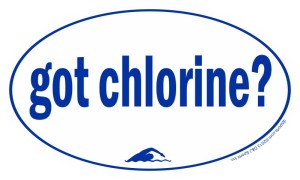Myth Busting: Is Chlorine Bad for You?
 Chlorine has been used to sterilize water for over 100 years and has been a go-to pool cleaner since the 1960s, when the United States Public Health Service published its first model ordinance for public pool construction, sterilization, and use. Since then, it has become a staple for most swimming facilities and even saltwater pools, which use a chlorine salt generator to sanitize the water.
Chlorine has been used to sterilize water for over 100 years and has been a go-to pool cleaner since the 1960s, when the United States Public Health Service published its first model ordinance for public pool construction, sterilization, and use. Since then, it has become a staple for most swimming facilities and even saltwater pools, which use a chlorine salt generator to sanitize the water.
As an Arizona swim school that has people using our pools year-round, we sometimes hear concerns about chlorine. Like almost every public pool, EVO uses low concentrations of chlorine to sanitize (kill germs and bacteria), oxidize (break down sweat, oils, and other organisms that wash off the body), and slow down algae growth. Studies have shown that minimal usage like ours is safe. In fact, Mary Ostrowski, Director of Chlorine Issues for the American Chemistry Council in Washington, D.C., says, “In a properly-maintained pool, any risk is likely to be very small.”
Some people are more sensitive to chlorine and may experience red eyes and dry skin and hair. The more significant side effects linked to chlorine are typically related to long-term overexposure or non-swimming situations, such as inhaling large amounts of chlorine gas or touching the raw, undiluted chemical.
At EVO’s Arizona swim school, safety is one of our top priorities. That’s why we have chosen to use just enough chlorine to ensure our pools are clean and safe, while keeping our swimmers comfortable and healthy. We also encourage every swimmer to take easy steps to keep your body safe, whether in a pool, ocean, or lake:
1. Shower with a natural soap before and after swimming.
2. Drink plenty of water beforehand, and try not to swallow large amounts of the water you’re swimming in.
3. Wear goggles so you can see without getting water, chemicals, or other debris in your eyes.
4. Avoid pools that look green or have a strong odor, as well as oceans and lakes that have polluted water.
If you have any other questions about swimming safety or lessons at our Arizona swim school, call EVO at 480-539-2660.
Citations:
https://msuweb.montclair.edu/~olsenk/pool.htm
Mary Ostrowski, director, chlorine issues, American Chemistry Council, Washington, D.C.

